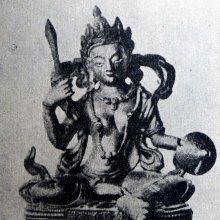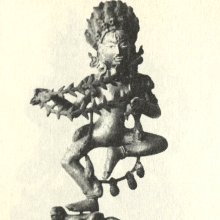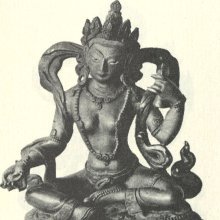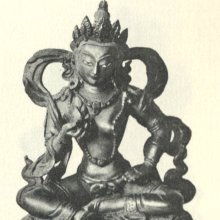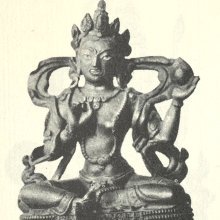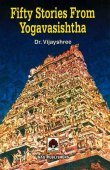Tithi, Tithī: 32 definitions
Introduction:
Tithi means something in Buddhism, Pali, Hinduism, Sanskrit, the history of ancient India, Marathi, Hindi. If you want to know the exact meaning, history, etymology or English translation of this term then check out the descriptions on this page. Add your comment or reference to a book if you want to contribute to this summary article.
Tithi has 31 English definitions available.
Images (photo gallery)
(+2 more images available)
Languages of India and abroad
Sanskrit dictionary
[Deutsch Wörterbuch]
Source: Cologne Digital Sanskrit Dictionaries: Böhtlingk and Roth Grosses Petersburger WörterbuchTithi (तिथि):—[UJJVAL.] zu [Uṇādisūtra 4, 2.] m. f. [Trikāṇḍaśeṣa 3, 5, 16.] [Siddhāntakaumudī 247], b, ult. [248], a, [1. 2.] ein lunarer Tag, deren 15 auf einen Halbmonat gehen, [Amarakoṣa 1, 1, 3, 1. 3, 4, 18, 124.] [Hemacandra’s Abhidhānacintāmaṇi 147.] [GOBH. 1, 1, 13. 2, 8, 12. 20.] [Śāṅkhāyana’s Gṛhyasūtrāṇi 1, 25. 5, 2.] [Manu’s Gesetzbuch 2, 30. 3, 276.] [Yājñavalkya’s Gesetzbuch 3, 324.] [Nalopākhyāna 5, 1.] [Sāvitryupākhyāna 3, 2.] [Mahābhārata 2, 35.] trayodaśī tithiruktā praśastā [3, 10670.] tithiṃ pakṣasya na brūyāt [13, 4992.] [Harivaṃśa 3873.] [Rāmāyaṇa 1, 19, 1.] [Suśruta 1, 6, 13. 15, 5. 104, 17.] [Kumārasaṃbhava 6, 93.] [Pañcatantra 8, 14.] [Kathāsaritsāgara 26, 66.] [Varāhamihira’s Bṛhajjātaka S. 4, 31. 5, 18.] die günstigen Tithi sind: Nandā, Bhadrā, Vijayā, Pūrṇā [93, 10.] pañcamī navamī ṣaṣṭhī caturdaśyaṣṭamī tathā . tithayo garhitā hyetā daṣṭasya maraṇātmakāḥ .. [Vetālapañcaviṃśati 16, 14.] [Sūryasiddhānta 1, 13. 2, 64. 66. 69. 4, 16.] tithinirṇaya m. Titel eines Werkes [MACK. Coll. 1, 30. 126.] tithinirṇayasaṃkṣepa m. desgl. [Weber’s Verzeichniss No. 1176.] saṃkṣepatithinirṇayasāra m. desgl. ebend. [1174.] tithī f. [Bharata] zu [Amarakoṣa] [Śabdakalpadruma] tithyaḥ nom. pl. [Mahābhārata 13, 4238.] — Als Bezeichnung der Zahl fünfzehn [Varāhamihira’s Bṛhajjātaka S. 52, 18.] [LAGHUJ. 1, 21.] [BṚH. 25 (24), 16.] [Sūryasiddhānta 1, 37. 38. 4, 3. 5, 10. 9, 6. 12, 82.] — Vgl. janmatithi .
--- OR ---
Tithi (तिथि):—, dvaidhaprakaraṇa n. Titel eines Werkes [Oxforder Handschriften 283,b, No. 662.] nirṇayasāra desgl. [276,a,22.] viveka desgl. [292,a,24.] sāraṇikā desgl. [327,b, No. 776.] tithyarka desgl. [HALL 176.] — Vgl. dustithi, mahā .
Source: Cologne Digital Sanskrit Dictionaries: Sanskrit-Wörterbuch in kürzerer FassungTithi (तिथि):—m. f. —
1) ein lunarer Tag. Auch tithī f. —
2) Bez. der Zahl fünfzehn.
Sanskrit, also spelled संस्कृतम् (saṃskṛtam), is an ancient language of India commonly seen as the grandmother of the Indo-European language family (even English!). Closely allied with Prakrit and Pali, Sanskrit is more exhaustive in both grammar and terms and has the most extensive collection of literature in the world, greatly surpassing its sister-languages Greek and Latin.
See also (Relevant definitions)
Starts with (+65): Tithe, Tithi Khana, Tithi-bhoga, Tithi-dhruva, Tithi-kendra, Tithi-shuddhi, Tithi-spashta-kendra, Tithibhadanika, Tithibhushana, Tithicakra, Tithicandrika, Tithicandrodaya, Tithicintamani, Tithicudamanikamadhenu, Tithidana, Tithidevata, Tithididhiti, Tithidvaidhaprakarana, Tithidvaita, Tithidvaitanirnaya.
Ends with (+50): Adhikatithi, Anatithi, Atithi, Bhatta medhatithi, Bhimatithi, Bhogya-tithi, Bhramaratithi, Bhukta-tithi, Brahmatithi, Capetapatanatithi, Dagdhatithi, Darsha-tithi, Deshatithi, Devatithi, Dhanyatithi, Divasatithi, Divatithi, Durgantaratithi, Dustithi, Ghatatithi.
Full-text (+899): Purnima, Tithyardha, Karana, Tithikshaya, Adhikatithi, Purna, Tithinirnaya, Pancadashi tithi, Sammukhi, Tithiprani, Tithi-kendra, Rikta, Tithi-shuddhi, Vishnutithi, Tithi-dhruva, Ratritithi, Dustithi, Kulatithi, Kulakulatithi, Yugadya.
Relevant text
Search found 68 books and stories containing Tithi, Tithī; (plurals include: Tithis, Tithīs). You can also click to the full overview containing English textual excerpts. Below are direct links for the most relevant articles:
The Indian Buddhist Iconography (by Benoytosh Bhattachacharyya)
Significance of the Moon in Ancient Civilizations (by Radhakrishnan. P)
2. Differentiation of Paksha Bala < [Chapter 6 - Relevance of Astrology]
13. Moon Star-days, Tithis and Vitamin Content < [Chapter 15 - Conclusion]
3. Pancha-purna-yoga < [Chapter 6 - Relevance of Astrology]
The Agni Purana (by N. Gangadharan)
Chapter 122 - Pañcāṅga: The Almanac
Chapter 123 - Description of the Svarodayacakra, etc.
Chapter 141 - Description of herbs used in charms, medicines etc.
The Brahmanda Purana (by G.V. Tagare)
Chapter 17 - Appropriate Tithis for performing Śrāddha < [Section 3 - Upodghāta-pāda]
Chapter 28 - Meeting of Purūravas and Pitṛs < [Section 2 - Anuṣaṅga-pāda]
Chapter 13 - The Real Nature of Kāla (time) < [Section 2 - Anuṣaṅga-pāda]
The Matsya Purana (critical study) (by Kushal Kalita)
Part 4.2a - Akṣayatṛtīyā-vrata < [Chapter 4 - Religious aspects of the Matsyapurāṇa]
Part 4.4 - List of other Vratas described in the Matsyapurāṇa < [Chapter 4 - Religious aspects of the Matsyapurāṇa]
Part 4.3a - Kṛṣṇāṣṭamī-vrata < [Chapter 4 - Religious aspects of the Matsyapurāṇa]
Garga Samhita (English) (by Danavir Goswami)
Verse 4.8.33 < [Chapter 8 - In the Story of the Yajña-sītās, the Glories of Ekādaśī]
Verse 4.8.50 < [Chapter 8 - In the Story of the Yajña-sītās, the Glories of Ekādaśī]
Verse 4.8.11 < [Chapter 8 - In the Story of the Yajña-sītās, the Glories of Ekādaśī]
Related products
